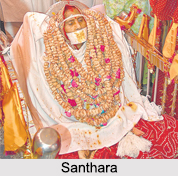 Santhara or Sallekhana is "Fast unto Death". It is also known as "Samlekhana". It is voluntary and its purpose is Self-Purification. According to Jainism, this is a way to purge oneself of bad "Karma" and attain "Moksha". One has to leave Attachments, Passions, etc. to attain Moksha.
Santhara or Sallekhana is "Fast unto Death". It is also known as "Samlekhana". It is voluntary and its purpose is Self-Purification. According to Jainism, this is a way to purge oneself of bad "Karma" and attain "Moksha". One has to leave Attachments, Passions, etc. to attain Moksha.
Santhara Vrata
Santhara is also a Vrata in the 12 Vratas to be followed by Sravaka. Being a very difficult vow to follow, very few can follow this vow to the end. Vow of Santhara or Sallekhana is taken due to old age or incurable disease or other reasons where death is inevitable. The purpose behind Sallekhana Vrata is self-elevation; gradually leaving solid food, then liquid food and ultimately leaving water too. However, to meditate is of utmost importance.
Types of Santhara
"Acharanga Sutra" describes the following three types of Santhara or Sallekhana (Marana). They are as follows:
1. Bhakta Pratyakhyana Marana: When one gradually leaves solid food, liquid and water. He may last for 1 to 3 months or go as long as up to 12 years. Such a vrata is undertaken by a person who has gained full self-control.
2. Ingini Marana: It is an exalted form of death which is prescribed for a well-controlled and instructed monk. In this type, the movements of the body are restricted together with the speech and the mind. Person lies on the ground, bearing pain without longing for food or water or any other comfort. He practices control of mind, speech and bodily activity.
3. Padapopagamana Marana: It is the most exalted form and the most difficult type of death practice wherein no bodily movement is permitted. The monk lies down or stands in a fixed posture without any signs and meditates till he leaves his body. Only when a Guru feels that the person is fit enough to undertake such Sallekhana, he permits the person to do it.
Transgressions in Santhara
It is ordained that during the observance of the vow, the person should avoid five Transgressions or Aticaras. The following five Aticaras are:
1. Desire for More Life.
2. Desire for Early Death.
3. Attachment (for Friends) and Fear/ Bhaya (for Death).
4. Desire to be born in Deva Loka or as Chakravarti.
5. Desire for Sensuous Pleasures.
Thus, it can be concluded that Sallekhana is a type of voluntary death. Death here is well planned under proper guidance and supervision, undertaken with the permission of the family members in the case of a householder and permission of a guru in the case of an ascetic.




















